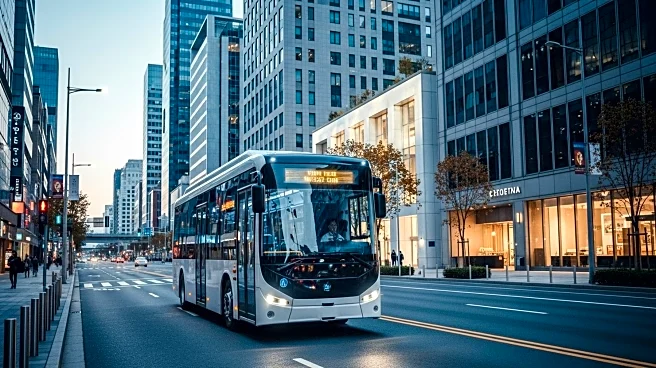What is the story about?
What's Happening?
The Seoul Metropolitan Government has announced the expansion of self-driving bus routes in the city, with new services set to begin in Seodaemun-gu and Dongdaemun-gu. This follows the successful introduction of the first self-driving bus route in Dongjak-gu earlier in 2025, which received high satisfaction ratings from residents. The new routes aim to improve access to administrative and welfare facilities and provide convenient transfers to subway services. The Dongdaemun A01 service will operate a 15km round-trip route, while the Seodaemun A01 service will cover a 3km route. Both services will be free until the second half of 2026, after which they will become paid services. Safety officers will be on board to ensure safe operation, and real-time arrivals will be available via the Bus Information Terminal.
Why It's Important?
The expansion of self-driving bus routes in Seoul represents a significant advancement in public transportation technology, potentially setting a precedent for other cities worldwide. By improving access to key facilities and enhancing connectivity with subway services, these autonomous buses could alleviate transportation blind spots and reduce congestion. The initiative reflects Seoul's commitment to integrating advanced transportation technologies into its public infrastructure, which could lead to increased efficiency and reduced operational costs. The success of these routes may encourage further investment in autonomous vehicle technology, impacting urban planning and public transportation policies.
What's Next?
As the self-driving bus services begin operation, the Seoul Metropolitan Government will likely monitor their performance closely to assess their impact on public transportation. Feedback from residents and data on usage patterns will be crucial in determining the future expansion of autonomous vehicle services. The city may explore additional routes or enhancements to existing services based on this data. Furthermore, the transition to a paid service in 2026 will require careful planning to ensure affordability and accessibility for all residents. Stakeholders, including transportation officials and technology providers, will need to collaborate to address any challenges that arise during the implementation phase.
Beyond the Headlines
The introduction of self-driving buses in Seoul raises important ethical and legal considerations, particularly regarding safety and liability. Ensuring the reliability of autonomous systems and addressing public concerns about safety will be critical. Additionally, the shift towards autonomous transportation may have long-term implications for employment in the transportation sector, as traditional driving roles evolve or diminish. The initiative also highlights the cultural shift towards embracing technology-driven solutions in urban environments, potentially influencing public attitudes towards automation and innovation.














